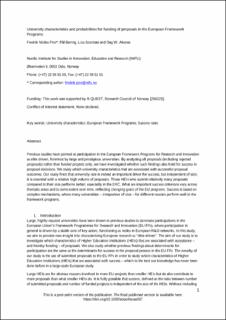University characteristics and probabilities for funding of proposals in the European Framework Programs
Peer reviewed, Journal article
Accepted version

View/
Date
2020Metadata
Show full item recordCollections
Original version
Piro, F. N., Børing, P., Scordato, L. & Aksnes, D. W. (2020). University characteristics and probabilities for funding of proposals in the European Framework Programs. Science and Public Policy, 1-13. 10.1093/scipol/scaa037Abstract
Previous studies have pointed at participation in the European Framework Programs for Research and Innovation as elite driven, foremost by large and prestigious universities. By analyzing all proposals (including rejected proposals) rather than funded projects only, we have investigated whether such findings also hold for success in proposal decisions. We study which university characteristics are associated with successful proposal outcomes. Our study finds that university size is indeed an important driver for success, but independent of size; it is essential with a relative high volume of proposals. Those Higher Education Institutions who submit relatively many proposals compared to their size performs better, especially in the European Research Council. What are important success criterions vary across thematic areas and to some extent over time, reflecting changing goals of the EU programs. Success is based on complex mechanisms, where many universities—irrespective of size—for different reasons perform well in the framework programs.